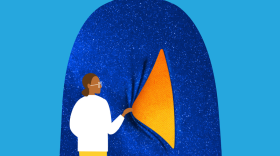
Anita Rao
Host and Executive Editor, "Embodied"Anita Rao is an award-winning journalist, host, creator, and executive editor of "Embodied," a weekly radio show and podcast about sex, relationships & health.
She has traveled the country recording interviews for the Peabody Award-winning StoryCorps production department, founded and launched a podcast about millennial feminism in the South, and served as the managing editor and regular host of "The State of Things," North Carolina Public Radio's flagship daily, live talk show. Anita was born in a small coal-mining town in Northeast England but spent most of her life growing up in Iowa and has a fond affection for the Midwest.
You can send Anita an e-mail at arao@wunc.org.
-
A neurogastroenterologist explains why gastrointestinal issues plague our nation — and how to make your bowel movements a joy.
-
Soph Myers-Kelley and his mom, René Myers, got diagnosed with the same connective tissue disorder one year apart. What happened next was a process of learning together — and getting glimpses into the past and future of what living with the disorder is like.
-
Food and sex have been deeply intertwined in our cultural imagination for millennia. Anita dives into the surprising history of why.
-
One woman breaks down the cost of her survival in the U.S. after fleeing Mexico in 2011 and dispels myths about immigrants being freeloaders.
-
An ornithologist and poet with a lifelong passion for birds explains what these creatures can teach us about wildness, joy and belonging.
-
The majority of American men over 35 will experience thinning hair and balding. Why is something so normal so culturally feared?
-
For 11 years, siblings Brad and Jocelyn Cox were a competitive figure skating duo. Through countless hours of training and performing together, the pair forged a tight bond that has served them far beyond their competition days.
-
If 2026 is the year you’re hoping to become known for giving great advice, Embodied is here to give you the tools to start the year off strong.
-
Specific marriage traditions and ceremonies have been around for millennia. But for some couples, reimagining the exchanging of the vows is a significant step of the process — from blending faiths and cultures to acknowledging queerness and relationships beyond the couple.
-
A writer shares how coming of age in his family’s Chinese restaurant shaped his understanding of his place in the world.







